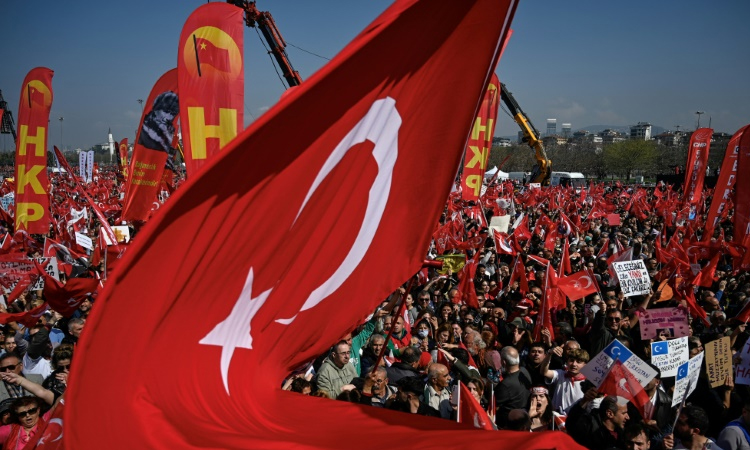News Flash
News Flash

ISTANBUL, April 19, 2025 (BSS/AFP) - Last month's jailing of Istanbul mayor Ekrem Imamoglu may have ousted Recep Tayyip Erdogan's biggest rival but the Turkish president is struggling to stamp out the spirit of protest ignited in Turkey's youth.
When Imamoglu was arrested on March 19, huge crowds began rallying in protest outside Istanbul City Hall every night with the demonstrations quickly spreading across the country in Turkey's biggest wave of unrest since 2013.
Although the mass demonstrations tapered off over the Eid festivities at the end of the Muslim fasting month of Ramadan, the protests have resumed over the past 10 days at universities in Istanbul and the capital Ankara.
In recent days, the spirit of rebellion has spread to dozens of schools following a decision by Erdogan's Islamist-rooted AKP to replace certain high school teachers in a move seen as a government take-over bid.
"There was already a sense of resentment (among the young people) but it has crystalised into a more open rejection of the AKP since mid-March," Demet Lukuslu, a sociology professor at Istanbul's Yeditepe University told AFP.
For some youngsters, it was a "rejection of society becoming more conservative and Islamised" and a demand for more "rights and freedoms".
- 'Breaking the silence' -
The move against Imamoglu, who was named the opposition CHP's candidate for the 2028 presidential race on the day he was jailed in a graft probe, triggered a broader wave of anger across Turkey, which has been ruled by Erdogan's AKP since 2002.
"It's a build-up of anger among millions of young people who have only ever known the AKP and who don't feel heard," explained Eda, who is in her final year at an Istanbul high school where protests took place this week.
"We want to break the silence which the government has used to establish its control," said this 17-year-old who did not give her surname, pointing out that several dozen of hundreds of students arrested over the protests were still in jail.
On Friday, Turkey began the first of a string of mass trials with 189 people in the dock over alleged offences linked to the protests, with many students among the defendants.
As the hearing got under way, hundreds of supporters protested outside, closely watched by an army of police, an AFP correspondent said.
"We are here for the trials of our friends who are in custody. We're by their side, we won't leave them on their own," a student called Ahmetcan Kaptan told AFP.
"We've overcome our fear and we're stronger, more united," he said.
- Financial backlash -
Imamoglu's arrest, which was widely denounced as a means to leave the CHP leaderless, has also had economic implications.
Aside from an opposition call to boycott firms seen as close to the government, Istanbul's benchmark BIST 100 stock exchange fell by nearly 14 percent over the month.
And the Turkish lira shed almost eight percent against the dollar, reaching an all-time low despite a $50-billion injection by the central bank to limit the damage.
On Thursday, the bank was forced to hike its key interest rate for the first time since March 2024, raising it to 46 percent from 42.5 percent.
The unrest has also raised fears for the government's recent efforts to draw a line under the conflict with the militant Kurdistan Workers' Party (PKK).
This week, Erdogan's nationalist ally Devlet Bahceli called for Imamoglu to be brought to trial as soon as possible, with some speculating it could derail efforts to disarm and disband the PKK.
Opposition leader and CHP head Ozgur Ozel, who has demanded snap elections, has called for a new mass protest at 1300 GMT this Saturday in Yozgat, the capital of a rural central province.
Earlier this month, farmers in the area were slapped with traffic fines for staging a tractor protest over Imamoglu's arrest, with Ozel reportedly expected to drive a tractor into the town centre for Saturday's rally.